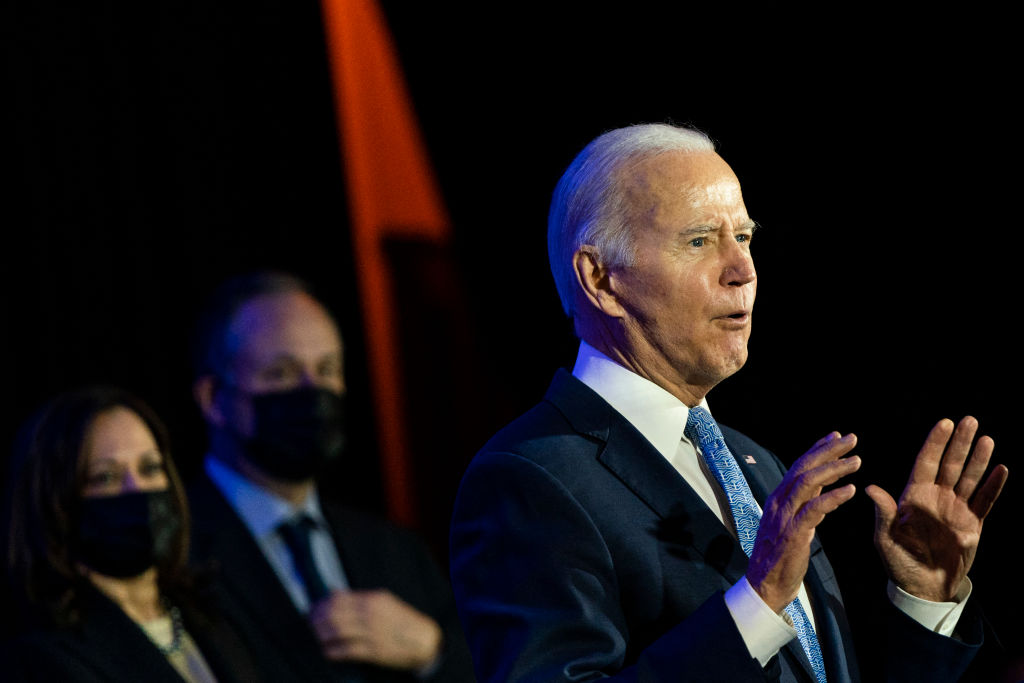Will President Joe Biden’s Build Back Better blunder be stopped by Democratic Sen. Joe Manchin?
Even with the spending bill pared down to $1.75 trillion, it’s still a horribly wasteful bundle of unnecessary spending on Democratic agenda items, and not necessarily ones Manchin can get behind — particularly since the White House’s suicidal set of climate change priorities would hit his state of West Virginia particularly hard.
The Democrats are growing increasingly frustrated with Manchin, yet his vote is necessary if they’re to secure the 50 votes needed to pass the bill via reconciliation.
A series of historically bad economic numbers have only strengthened the senator’s position that the inflationary pressure that Build Back Better would create is untenable.
(Here at The Western Journal, we’ve been covering how untenable the so-called Build Back Better bill was from the beginning, particularly given inflation and the realities of energy production. These seem to be mysteries for the mainstream media, despite the fact they’re obvious to anyone paying attention. You can help us bring these truths to readers by subscribing today.)
Despite the unfortunate encroachment of reality strengthening Manchin’s hand in negotiations, a report from Politico indicated that it’s the president getting frustrated with the West Virginia senator and not the other way around.
According to the Wednesday article, a source said the talks between the White House and the Senate’s swing vote “have been going very poorly. They are far apart.”
“Though Manchin and Biden developed a warm rapport this year and collaborated on several prominent pieces of legislation, the plodding pace of the talks between the two Joes threatens is straining their friendly relationship,” Politico reported.
“Frustration among White House aides with Manchin is high and growing,” it said. “And while Biden likes Manchin personally, he too has grown tired of the elongated talks and will soon push him to make a decision and support the legislation, according to two White House sources.”
The problem is that Manchin, while reportedly not trying to hold up Biden’s agenda, has no reason to support a bill that’s not limited to his prerogatives.
In addition, he’s “raised fundamental concerns on how the bill is structured, questioning its 10-year financing when lawmakers are authorizing programs on shorter time spans,” according to Politico.
“Sen. Manchin is not telling President Biden what to include or not include. He has always been supportive” of the $300-a-month child tax credit included in the bill, a source close to Manchin told Politico. “He has also made it clear the cost should not be greater than $1.75 trillion.”
The child tax credit has been one of the reasons the Democrats have been pushing Manchin on the bill, given that it expires when the year ends. While Democrats love the line item, it’s also exorbitantly expensive — $1.4 trillion over 10 years.
Manchin has expressed exasperation with media reports that he wants to end the credit, calling them “bulls***” on Wednesday.
It seems increasingly likely a deal on the bill won’t be reached before the year ends.
The longer negotiations continue, the less reason the senator has to vote for the bill as currently constituted.
Inflation numbers in November were wretched, with a 6.8 percent increase in year-over-year prices — the biggest surge since 1982, almost 40 years. So much for that “transitory” inflation, to use a favorite word of Biden administration apparatchiks.
That’s a number dire enough that two Obama administration economists — Larry Summers and Steven Rattner — sounded the alarm during an appearance on Bloomberg TV last week.
“We’re having it confirmed that it’s not transitory, and I think everybody recognizes now with the statements from Chairman Powell, with the statements from Secretary Yellen, that this isn’t going to just go away of its own accord,” said Summers, former head of President Barack Obama’s White House National Economic Council.
“That the Fed’s going to have to take substantial action to control inflation unless there’s some other kind of adverse development, a crack in markets or something of that kind,” he said.
“We’ve put in motion for the first time in 40 years, excessive inflation, caused by overheating of the economy, and that’s going to have to be worked out of the system and that’s probably not going to be such an easy thing.”
Rattner, head of Obama’s auto industry task force, also said “you have to recognize that it’s a problem that was not created in two months. It’s a problem created over the last two years, and so it’s going to take multiple years, certainly, to work it out.”
[firefly_embed]
[/firefly_embed]
A liberal $1.75 trillion boondoggle bill that would (among other things) take cars off the road, spend massive amounts of cash to subsidize otherwise-uncompetitive electric cars to replace them and raises taxes to do it isn’t going to help lower those numbers, either.
The ball is in Manchin’s court, but not just his; the other Democrat swing vote, Arizona Sen. Kyrsten Sinema, also hasn’t committed to the bill. And yet Democrats seem to be furious at them, as if they’re holding up democracy by having their own opinions.
Those opinions, such as they are, happen to be the only things keeping America from the problematic excesses of Build Back Better.
This article appeared originally on The Western Journal.
























